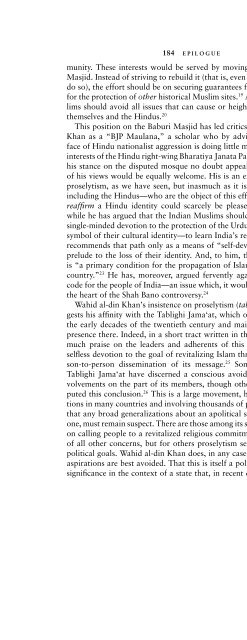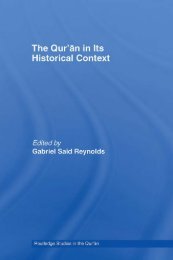Download (1 MB) - Islam and Christian-Muslim Relations: Articles ...
Download (1 MB) - Islam and Christian-Muslim Relations: Articles ...
Download (1 MB) - Islam and Christian-Muslim Relations: Articles ...
You also want an ePaper? Increase the reach of your titles
YUMPU automatically turns print PDFs into web optimized ePapers that Google loves.
184 EPILOGUEmunity. These interests would be served by moving beyond the BaburiMasjid. Instead of striving to rebuild it (that is, even if it were possible todo so), the effort should be on securing guarantees from the governmentfor the protection of other historical <strong>Muslim</strong> sites. 19 And in general, <strong>Muslim</strong>sshould avoid all issues that can cause or heighten discord betweenthemselves <strong>and</strong> the Hindus. 20This position on the Baburi Masjid has led critics to see Wahid al-dinKhan as a “BJP Maulana,” a scholar who by advising patience in theface of Hindu nationalist aggression is doing little more than serving theinterests of the Hindu right-wing Bharatiya Janata Party (BJP). 21 But whilehis stance on the disputed mosque no doubt appeals to the BJP, not allof his views would be equally welcome. His is an emphasis on peacefulproselytism, as we have seen, but inasmuch as it is the non-<strong>Muslim</strong>s—including the Hindus—who are the object of this effort, those seeking toreaffirm a Hindu identity could scarcely be pleased with it. 22 Further,while he has argued that the Indian <strong>Muslim</strong>s should move beyond theirsingle-minded devotion to the protection of the Urdu language—long thesymbol of their cultural identity—to learn India’s regional languages, herecommends that path only as a means of “self-development,” not as aprelude to the loss of their identity. And, to him, this self-developmentis “a primary condition for the propagation of <strong>Islam</strong>ic teachings in thiscountry.” 23 He has, moreover, argued fervently against a uniform civilcode for the people of India—an issue which, it would be recalled, was atthe heart of the Shah Bano controversy. 24Wahid al-din Khan’s insistence on proselytism (tabligh) obviously suggestshis affinity with the Tablighi Jama‘at, which originated in India inthe early decades of the twentieth century <strong>and</strong> maintains an importantpresence there. Indeed, in a short tract written in the 1960s, he lavishesmuch praise on the leaders <strong>and</strong> adherents of this movement for theirselfless devotion to the goal of revitalizing <strong>Islam</strong> through a patient, person-to-persondissemination of its message. 25 Some observers of theTablighi Jama‘at have discerned a conscious avoidance of political involvementson the part of its members, though other scholars have disputedthis conclusion. 26 This is a large movement, however, with operationsin many countries <strong>and</strong> involving thous<strong>and</strong>s of people, which meansthat any broad generalizations about an apolitical stance, or the lack ofone, must remain suspect. There are those among its supporters who insiston calling people to a revitalized religious commitment to the exclusionof all other concerns, but for others proselytism seems not to precludepolitical goals. Wahid al-din Khan does, in any case, argue that politicalaspirations are best avoided. That this is itself a political stance of somesignificance in the context of a state that, in recent decades, has seen an



